See Page 1 |
2 |
3 |
4 | of the July 2023 homepage archives. Monday the 31st
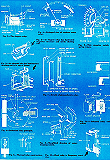 Even back in 1961 when this "How
Relays Work" article appeared in Radio-Electronics magazine, there
was a large variety of electromechanical relay types. Many of those have been supplemented
or replaced by solid state equivalents, but there are still some applications where
only good old hard physical contacts can do the job for both practical and economic
reasons. Very high temperatures and systems with no electronic interface are examples.
One very common example of the latter is the contacts that a centrifugal switch
uses to take the starter capacitor of single-phase induction motor in and out of
the circuit. The main diagram shows a clapper relay, a meter relay, an induction
relay, a thermal relay, reed relay, and a piezoelectric relay, among others. In
the days before everything being controlled by solid state devices, amazing electromechanical
contraptions were designed to perform actions according to mathematical equations
describing physics principles. Gun turrets on ships, airplanes, and tanks are significant
examples of target tracking and motion compensation used in fire-control systems
which incorporated many relays... Even back in 1961 when this "How
Relays Work" article appeared in Radio-Electronics magazine, there
was a large variety of electromechanical relay types. Many of those have been supplemented
or replaced by solid state equivalents, but there are still some applications where
only good old hard physical contacts can do the job for both practical and economic
reasons. Very high temperatures and systems with no electronic interface are examples.
One very common example of the latter is the contacts that a centrifugal switch
uses to take the starter capacitor of single-phase induction motor in and out of
the circuit. The main diagram shows a clapper relay, a meter relay, an induction
relay, a thermal relay, reed relay, and a piezoelectric relay, among others. In
the days before everything being controlled by solid state devices, amazing electromechanical
contraptions were designed to perform actions according to mathematical equations
describing physics principles. Gun turrets on ships, airplanes, and tanks are significant
examples of target tracking and motion compensation used in fire-control systems
which incorporated many relays...
 Aegis Power Systems is a leading supplier
of AC-DC and
DC-DC power supplies for custom and special applications. Aegis has been designing
and building highly reliable custom power supplies since 1995. They offer a complete
line of switch mode power supplies and power converters for a variety of markets
including defense, industrial, aircraft, VME, and telecom. Supports military, aircraft,
EV, telecom, and embedded computing applications. Design and manufacture of custom
power supply solutions to meet each customer's exacting specifications. Please visit
Aegis Power Systems today. Manufactured in the USA. Aegis Power Systems is a leading supplier
of AC-DC and
DC-DC power supplies for custom and special applications. Aegis has been designing
and building highly reliable custom power supplies since 1995. They offer a complete
line of switch mode power supplies and power converters for a variety of markets
including defense, industrial, aircraft, VME, and telecom. Supports military, aircraft,
EV, telecom, and embedded computing applications. Design and manufacture of custom
power supply solutions to meet each customer's exacting specifications. Please visit
Aegis Power Systems today. Manufactured in the USA.
 Frequency crowding has evidently been an
issue since the early days of radio according to this 1930 article in Radio-Craft
magazine. The situation was really bad in the earliest times when unfiltered spark
type transmitters were the norm. Those pioneers could be credited, I suppose, with
being the first users of wideband communications, but it was not because they chose
to do so. Here author Clyde Fitch discusses the debate over whether there really
were such things as sidebands from modulation (yes, it was questionable in the day)
and makes an argument for their existence based on analysis of various types of
modulation. In particular, he predicts the coming popularity of single sideband
receivers with crystal-filtered channels (also a relatively new concept), and the
need for matching SSB transmitters with... wait for it... carrier and sideband suppression.
He also reviews "The Heterodyne Theory..." Frequency crowding has evidently been an
issue since the early days of radio according to this 1930 article in Radio-Craft
magazine. The situation was really bad in the earliest times when unfiltered spark
type transmitters were the norm. Those pioneers could be credited, I suppose, with
being the first users of wideband communications, but it was not because they chose
to do so. Here author Clyde Fitch discusses the debate over whether there really
were such things as sidebands from modulation (yes, it was questionable in the day)
and makes an argument for their existence based on analysis of various types of
modulation. In particular, he predicts the coming popularity of single sideband
receivers with crystal-filtered channels (also a relatively new concept), and the
need for matching SSB transmitters with... wait for it... carrier and sideband suppression.
He also reviews "The Heterodyne Theory..."
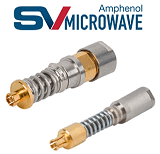  I saw these
unique connectors on the everythingRF website. They are VITA 67.3 types
meant for quick connection and disconnection, and they have a spring inline to maintain
contact pressure under extreme conditions of temperature, shock, and vibration.
Speaking of "shock," they remind me of the miniature shocks for R/C cars. "SV Microwave, a leading
provider of RF and microwave connectors, has released its latest line of VITA 67.3
contact terminations designed to prevent harmful RF signal reflections in embedded
systems. SV Microwave's VITA product line represents a significant addition
to the RF/coaxial section of the VPX platform, reinforcing the company's commitment
to innovation and quality. RF signal reflections, which occur when signals bounce
back from unused or open ports within a system, can cause detrimental effects such
as overloading and damage. By introducing the SMPM/SMPS VITA 67.3 RF Terminations,
SV Microwave addresses these concerns and provides an effective solution to
safeguard embedded systems..." I saw these
unique connectors on the everythingRF website. They are VITA 67.3 types
meant for quick connection and disconnection, and they have a spring inline to maintain
contact pressure under extreme conditions of temperature, shock, and vibration.
Speaking of "shock," they remind me of the miniature shocks for R/C cars. "SV Microwave, a leading
provider of RF and microwave connectors, has released its latest line of VITA 67.3
contact terminations designed to prevent harmful RF signal reflections in embedded
systems. SV Microwave's VITA product line represents a significant addition
to the RF/coaxial section of the VPX platform, reinforcing the company's commitment
to innovation and quality. RF signal reflections, which occur when signals bounce
back from unused or open ports within a system, can cause detrimental effects such
as overloading and damage. By introducing the SMPM/SMPS VITA 67.3 RF Terminations,
SV Microwave addresses these concerns and provides an effective solution to
safeguard embedded systems..."
 Here is the Radio Service Data Sheet for
the
General Electric Model K-40-A tabletop radio, as featured in a 1933 edition
of Radio-Craft magazine. When posting vintage documentation, I attempt
to find photos of an actual radio. My first stop is eBay, since often some of the
best detailed images of the outside and inside show up there. Next are RadioMuseum
and RadioAttic. Some models are popular restoration projects and others even extensive
searching turns up nothing at all - not even a drawing or an old advertisement.
Notice how even the less sophisticated vintage radios like this General Electric
K-40 usually have nicely crafted wooden cases. As mentioned many times in the past,
I post these online for the benefit of hobbyists looking for information... Here is the Radio Service Data Sheet for
the
General Electric Model K-40-A tabletop radio, as featured in a 1933 edition
of Radio-Craft magazine. When posting vintage documentation, I attempt
to find photos of an actual radio. My first stop is eBay, since often some of the
best detailed images of the outside and inside show up there. Next are RadioMuseum
and RadioAttic. Some models are popular restoration projects and others even extensive
searching turns up nothing at all - not even a drawing or an old advertisement.
Notice how even the less sophisticated vintage radios like this General Electric
K-40 usually have nicely crafted wooden cases. As mentioned many times in the past,
I post these online for the benefit of hobbyists looking for information...
 Banner Ads are rotated in all locations
on the page! RF Cafe typically receives 8,000-15,000 visits each
weekday. RF Cafe
is a favorite of engineers, technicians, hobbyists, and students all over the world.
With more than 17,000 pages in the Google search index, RF Cafe returns in
favorable positions on many types of key searches, both for text and images.
Your 728x90-px and 160x600-px Banner Ads are displayed on average 225,000 times
per year! New content is added on a daily basis, which keeps the major search
engines interested enough to spider it multiple times each day. Items added on the
homepage often can be found in a Google search within a few hours of being posted. If you need your company news to
be seen, RF Cafe is the place to be... Banner Ads are rotated in all locations
on the page! RF Cafe typically receives 8,000-15,000 visits each
weekday. RF Cafe
is a favorite of engineers, technicians, hobbyists, and students all over the world.
With more than 17,000 pages in the Google search index, RF Cafe returns in
favorable positions on many types of key searches, both for text and images.
Your 728x90-px and 160x600-px Banner Ads are displayed on average 225,000 times
per year! New content is added on a daily basis, which keeps the major search
engines interested enough to spider it multiple times each day. Items added on the
homepage often can be found in a Google search within a few hours of being posted. If you need your company news to
be seen, RF Cafe is the place to be...
 The
Wireless Telecom Group,
comprised of Boonton, Holzworth, and Noisecom, is a global designer and manufacturer
of advanced RF and microwave components, modules, systems, and instruments. Serving
the wireless, telecommunication, satellite, military, aerospace, semiconductor and
medical industries, Wireless Telecom Group products enable innovation across a wide
range of traditional and emerging wireless technologies. A unique set of high-performance
products including peak power meters, signal generators, phase noise analyzers,
signal processing modules, 5G and LTE PHY/stack software, noise sources, and programmable
noise generators. The
Wireless Telecom Group,
comprised of Boonton, Holzworth, and Noisecom, is a global designer and manufacturer
of advanced RF and microwave components, modules, systems, and instruments. Serving
the wireless, telecommunication, satellite, military, aerospace, semiconductor and
medical industries, Wireless Telecom Group products enable innovation across a wide
range of traditional and emerging wireless technologies. A unique set of high-performance
products including peak power meters, signal generators, phase noise analyzers,
signal processing modules, 5G and LTE PHY/stack software, noise sources, and programmable
noise generators.
Sunday the 30th
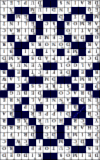 This week's
crossword puzzle for July 30th sports an electronics theme. This being the 30th
day of the month, many of the words begin and/or end with the letter "D." Since
there are only 26 letters in the alphabet, I use the modulo function to derive the
letter to use; i.e., 30 mod 26 = 4. Clues for words containing "D" are marked with
an asterisk (*). All RF Cafe crossword puzzles are custom made by me, Kirt Blattenberger,
and have only words and clues related to RF, microwave, and mm-wave engineering,
optics, mathematics, chemistry, physics, and other technical subjects. As always,
this crossword contains no names of politicians, mountain ranges, exotic foods or
plants, movie stars, or anything of the sort unless it/he/she is related to this
puzzle's technology theme (e.g., Reginald Denny, Hedy Lamarr, or the Tunguska event
in Siberia). The technically inclined cruciverbalists amongst us will appreciate
the effort. Enjoy! This week's
crossword puzzle for July 30th sports an electronics theme. This being the 30th
day of the month, many of the words begin and/or end with the letter "D." Since
there are only 26 letters in the alphabet, I use the modulo function to derive the
letter to use; i.e., 30 mod 26 = 4. Clues for words containing "D" are marked with
an asterisk (*). All RF Cafe crossword puzzles are custom made by me, Kirt Blattenberger,
and have only words and clues related to RF, microwave, and mm-wave engineering,
optics, mathematics, chemistry, physics, and other technical subjects. As always,
this crossword contains no names of politicians, mountain ranges, exotic foods or
plants, movie stars, or anything of the sort unless it/he/she is related to this
puzzle's technology theme (e.g., Reginald Denny, Hedy Lamarr, or the Tunguska event
in Siberia). The technically inclined cruciverbalists amongst us will appreciate
the effort. Enjoy!
Friday the 28th
 According to the postscript to this editorial,
Hugo Gernsback wrote his opinion on the then current state of space exploration
and his recommendation for how future efforts should proceed, a month before Alan
Shepherd made his historic suborbital flight aboard the Freedom 7 Mercury capsule.
That May 5, 1961, feat marked mankind's first foray into space. Surprisingly, Gernsback
was not in favor of a
manned space program. He believed the resources and expense required to support
human life in space would be better invested in developing autonomous and remotely
controlled robotic systems. Many people agreed with him then and today. Although
I do not oppose manned space flight, I tend to agree with Gernsback that much more
can be accomplished with machines than with humans. NASA's many successes on Mars
are evidence of the accomplishments possible with robots, and the long-term missions
possible. At some point it might be necessary to explore sending men to other planets,
but there really is no imperative at this time - just a desire to do so. Coincidentally
(or maybe not so coincidentally), Mr. Gernsback refers to his vision of a lunar
probe as "surveyor," which was name of NASA's series of robotic lunar lander probes
deployed... According to the postscript to this editorial,
Hugo Gernsback wrote his opinion on the then current state of space exploration
and his recommendation for how future efforts should proceed, a month before Alan
Shepherd made his historic suborbital flight aboard the Freedom 7 Mercury capsule.
That May 5, 1961, feat marked mankind's first foray into space. Surprisingly, Gernsback
was not in favor of a
manned space program. He believed the resources and expense required to support
human life in space would be better invested in developing autonomous and remotely
controlled robotic systems. Many people agreed with him then and today. Although
I do not oppose manned space flight, I tend to agree with Gernsback that much more
can be accomplished with machines than with humans. NASA's many successes on Mars
are evidence of the accomplishments possible with robots, and the long-term missions
possible. At some point it might be necessary to explore sending men to other planets,
but there really is no imperative at this time - just a desire to do so. Coincidentally
(or maybe not so coincidentally), Mr. Gernsback refers to his vision of a lunar
probe as "surveyor," which was name of NASA's series of robotic lunar lander probes
deployed...
 Holy moly!
Will climate deniers finally admit they are wrong? These record high temperatures
are now part of official history: 116 °F in Collegeville, IN | 114 °F in Aberdeen,
SD | 110 °F in Decatur, IL | 108 °F in Rochester, MN | 107 °F Baltimore, MD | 106
°F in Cincinnati, OH | 106 °F in Duluth, MN | 106 °F in Central Park, New York City.
Those are just locations in the northern half of the U.S. where cool summers normally
prevail! People without air conditioning are in the greatest danger. It is little
wonder some legislators in the past few years have proposed banning gas stoves,
farting cows, and pickup trucks. Science deniers should look back a century ago
and compare today's temperatures to, say,
1936.
Wait. Actually, that is exactly the year those still-standing record highs were
set. Nobody had A/C at the time, many had no electric service, and the average number
of autos per household was <1.
USA population density was 15 people/km then, and is 40 peeps/km now. I hate
hot weather and would dearly love a new
Little Ice Age, but IMHO
this global warming hype is mostly a means of making a few groups and individuals
enormously wealthy at the expense, health, comfort, and inconvenience of everyone
else - kind of like human extinction pandemic events. Take a look at how "they"
live and then maybe adopt some skepticism. Holy moly!
Will climate deniers finally admit they are wrong? These record high temperatures
are now part of official history: 116 °F in Collegeville, IN | 114 °F in Aberdeen,
SD | 110 °F in Decatur, IL | 108 °F in Rochester, MN | 107 °F Baltimore, MD | 106
°F in Cincinnati, OH | 106 °F in Duluth, MN | 106 °F in Central Park, New York City.
Those are just locations in the northern half of the U.S. where cool summers normally
prevail! People without air conditioning are in the greatest danger. It is little
wonder some legislators in the past few years have proposed banning gas stoves,
farting cows, and pickup trucks. Science deniers should look back a century ago
and compare today's temperatures to, say,
1936.
Wait. Actually, that is exactly the year those still-standing record highs were
set. Nobody had A/C at the time, many had no electric service, and the average number
of autos per household was <1.
USA population density was 15 people/km then, and is 40 peeps/km now. I hate
hot weather and would dearly love a new
Little Ice Age, but IMHO
this global warming hype is mostly a means of making a few groups and individuals
enormously wealthy at the expense, health, comfort, and inconvenience of everyone
else - kind of like human extinction pandemic events. Take a look at how "they"
live and then maybe adopt some skepticism.
 By the early 1930s when this
Stenode vacuum tube article appeared in Radio-Craft magazine, commercial
broadcast stations were still working out what would be the best combination of
channel bandwidth and spacing to enable a maximum number of adjacent transmissions
while achieving sufficient selectivity to enable acceptable reception. 5 kHz
was deemed reasonable to reproduce the human voice as well as musical instruments.
An accompanying 10 kHz channel separation (still in effect today) was adopted
to accommodate upper and lower sidebands that amplitude modulation creates. Interestingly,
if you read carefully, the Stenode's high level of selectivity, made possible by
an integrated crystal, was intended to remove modulation sidebands and thereby significantly
narrow the required bandwidth. A debate within the engineering community existed
then regarding the usefulness of and need for upper and lower sidebands... By the early 1930s when this
Stenode vacuum tube article appeared in Radio-Craft magazine, commercial
broadcast stations were still working out what would be the best combination of
channel bandwidth and spacing to enable a maximum number of adjacent transmissions
while achieving sufficient selectivity to enable acceptable reception. 5 kHz
was deemed reasonable to reproduce the human voice as well as musical instruments.
An accompanying 10 kHz channel separation (still in effect today) was adopted
to accommodate upper and lower sidebands that amplitude modulation creates. Interestingly,
if you read carefully, the Stenode's high level of selectivity, made possible by
an integrated crystal, was intended to remove modulation sidebands and thereby significantly
narrow the required bandwidth. A debate within the engineering community existed
then regarding the usefulness of and need for upper and lower sidebands...
 "Autonomous vehicles and robots rely on radar
to detect its surrounding environment with the use of numerous front ends and MIMO
antennas. But the numerous radars needed to do this means managing large amounts
of data, which often causes issues. California-based chipmaker Ambarella wants to
overcome these challenges and streamline the entire process with its new centrally
processed
4D imaging radar system. It allows for both central processing of raw radar
and deep, low-level fusion with other sensor inputs, including cameras, ultrasonics,
and lidar. Why make things centralized? Centralized processing offers improved environmental
perception and safer path planning in AI-based advanced driver-assistance systems
(ADAS) and L2+ to L5 autonomous-driving systems..." "Autonomous vehicles and robots rely on radar
to detect its surrounding environment with the use of numerous front ends and MIMO
antennas. But the numerous radars needed to do this means managing large amounts
of data, which often causes issues. California-based chipmaker Ambarella wants to
overcome these challenges and streamline the entire process with its new centrally
processed
4D imaging radar system. It allows for both central processing of raw radar
and deep, low-level fusion with other sensor inputs, including cameras, ultrasonics,
and lidar. Why make things centralized? Centralized processing offers improved environmental
perception and safer path planning in AI-based advanced driver-assistance systems
(ADAS) and L2+ to L5 autonomous-driving systems..."
 This Radio Service Data Sheet for the
Zenith Challenger Model 740, 10 tube, battery-operated superheterodyne floor
console radio was published in the June 1934 issue of Radio-Craft magazine. As was
typical of the era, a finely styled wooden cabinet housed the electronics chassis
and speaker. Large dials and knobs would be be in vogue for a few more years. Programmable
buttons for storing channel tuning were still rare at the time, too. The Zenith
Challenger 740 was battery powered, which was popular in rural areas not yet serviced
by AC lines. A bonus of that configuration was no 60 or 120 Hz hum from the
power supply. A fairly unique feature for this early of a radio was its permanent
magnet "reproducer" (aka speaker). The "ballast resistor tube" (V10) is a resistance
device used to help limit and regulate current flow... This Radio Service Data Sheet for the
Zenith Challenger Model 740, 10 tube, battery-operated superheterodyne floor
console radio was published in the June 1934 issue of Radio-Craft magazine. As was
typical of the era, a finely styled wooden cabinet housed the electronics chassis
and speaker. Large dials and knobs would be be in vogue for a few more years. Programmable
buttons for storing channel tuning were still rare at the time, too. The Zenith
Challenger 740 was battery powered, which was popular in rural areas not yet serviced
by AC lines. A bonus of that configuration was no 60 or 120 Hz hum from the
power supply. A fairly unique feature for this early of a radio was its permanent
magnet "reproducer" (aka speaker). The "ballast resistor tube" (V10) is a resistance
device used to help limit and regulate current flow...
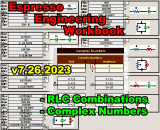 A new version (7.26.2023)
of the recently released
RF Cafe Espresso Engineering Workbook™ is now available (free download). Two
new worksheets were added: "RLC Combinations" calculates the complex impedance and,
where applicable, time constant and resonant frequency of series and parallel combinations
of resistors, inductors, and capacitors. A familiar R ± jX format
is provided. "Complex Numbers" calculates the sum, difference, product, and quotient
of two complex numbers. It also provides the R ± jX format as the
solution. I hope to make updates every two weeks or so, as time permits. In the
next release I plan to include a calculator that provides properly formatted error
analysis results for the sum, difference, product, and quotient of two numbers with
specified best estimate and uncertainty values. Many, if not most, people do not
adhere to the standards set by science publications. A new version (7.26.2023)
of the recently released
RF Cafe Espresso Engineering Workbook™ is now available (free download). Two
new worksheets were added: "RLC Combinations" calculates the complex impedance and,
where applicable, time constant and resonant frequency of series and parallel combinations
of resistors, inductors, and capacitors. A familiar R ± jX format
is provided. "Complex Numbers" calculates the sum, difference, product, and quotient
of two complex numbers. It also provides the R ± jX format as the
solution. I hope to make updates every two weeks or so, as time permits. In the
next release I plan to include a calculator that provides properly formatted error
analysis results for the sum, difference, product, and quotient of two numbers with
specified best estimate and uncertainty values. Many, if not most, people do not
adhere to the standards set by science publications.
Lotus Communication Systems began in 2009,
setting up CNC machine shop and RF/microwave assembling and testing lab in Middlesex
Country, Massachusetts. Lotus is committed to highest quality and innovative products.
Each RF/microwave module meets
exceedingly high standards of quality, performance and excellent value, and are
100% Made in the USA. Lotus' RF/microwave products cover frequency band up to 67
GHz. Lotus also offers an COTS shield enclosures for RF/microwave prototyping and
production. All products are custom designed. We will find a solution and save your
time and cost. Lotus has multiple 4 axis CNC machines and LPKF circuit plotters.
In stock, 1-day free shipping.
Thursday the 27th
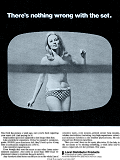 Here is another one of those ads you would
not likely see in a present day engineering magazine. Today, you'll routinely find
racier images in JC Penny and Target advertisements (although in the latter example
the girl might not be a real girl). Loral Electronics is a well-known defense systems
contractor founded in the late 1940s by William Lorenz
and Leon Alpert. Loral specialized in aerospace and avionics
(airborne) systems like radar, radios, satellite navigation and communications.
They also had a component distribution division which sold, among other items, the
Arcolytic capacitors represented in this 1968 Radio-Electronics magazine
promotion. Lockheed Martin bought Loral in 1996, the same year Loral was accused
of transferring missile stabilization technology to China, which was useful in their
Long March intercontinental ballistic missile (ICBM) program. Here is another one of those ads you would
not likely see in a present day engineering magazine. Today, you'll routinely find
racier images in JC Penny and Target advertisements (although in the latter example
the girl might not be a real girl). Loral Electronics is a well-known defense systems
contractor founded in the late 1940s by William Lorenz
and Leon Alpert. Loral specialized in aerospace and avionics
(airborne) systems like radar, radios, satellite navigation and communications.
They also had a component distribution division which sold, among other items, the
Arcolytic capacitors represented in this 1968 Radio-Electronics magazine
promotion. Lockheed Martin bought Loral in 1996, the same year Loral was accused
of transferring missile stabilization technology to China, which was useful in their
Long March intercontinental ballistic missile (ICBM) program.
 It arrived in my e-mail. "We don't all have
the option of rooftop solar, and most HOAs frown on installing wind turbines. So,
why not leave the clean energy production to us by enrolling in
Renewable Advantage?" Have they no
shame? Let me answer that: Of course not. Duke is seemingly discouraging people
from installing private power generation systems while also offering, as required
by law in many states, a plan for supplementing private PV and wind sources with
Duke service, and even
selling excess capacity to them. Duke Energy is the electric power service provider
in my area. Rates have been
increasing - sometimes by double digits - for the last couple years. Frequently
on the radio I hear where they are seeking yet more hikes. A large part of the reason
for high costs is the construction of expensive "renewable" sources while mothballing
existing reliable, efficient generation facilities. The huge
carbon footprint per kWh for manufacturing, installing, and maintaining wind
and solar generation is well documented, but not reported by mainstream news sources.
As often stated, I enthusiastically promote wind and solar, but resent the
gaslighting perpetrated
by government and corporate propagandists - always at the expense of productive
citizens who pay for it all. It arrived in my e-mail. "We don't all have
the option of rooftop solar, and most HOAs frown on installing wind turbines. So,
why not leave the clean energy production to us by enrolling in
Renewable Advantage?" Have they no
shame? Let me answer that: Of course not. Duke is seemingly discouraging people
from installing private power generation systems while also offering, as required
by law in many states, a plan for supplementing private PV and wind sources with
Duke service, and even
selling excess capacity to them. Duke Energy is the electric power service provider
in my area. Rates have been
increasing - sometimes by double digits - for the last couple years. Frequently
on the radio I hear where they are seeking yet more hikes. A large part of the reason
for high costs is the construction of expensive "renewable" sources while mothballing
existing reliable, efficient generation facilities. The huge
carbon footprint per kWh for manufacturing, installing, and maintaining wind
and solar generation is well documented, but not reported by mainstream news sources.
As often stated, I enthusiastically promote wind and solar, but resent the
gaslighting perpetrated
by government and corporate propagandists - always at the expense of productive
citizens who pay for it all.
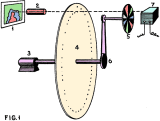 It really wasn't all that long ago when
most people worked on computers with
Color Graphics Adapter (CGA) that had just 16 colors (4-bit pixels). In the
late 1980s (wow, maybe it really was a long time ago), the luxury of a 256-color
(8-bit pixels) Video Graphics Adapter (VGA) monitor and video card would cost you
around $300 each. I recall seeing ads for "16 million color" displays by ViewSonic
that ran north of a kilobuck. My first "real" monitor was bought in 1987 and was
4-bit monochrome. Televisions, as you know, began as black and white (actually a
infinite number of gray levels between black and white). When TVs first arrived
in people's homes, they were glad for any kind of display, but it wasn't long before
marketing gurus convinced the masses that anything less than color would be unacceptable... It really wasn't all that long ago when
most people worked on computers with
Color Graphics Adapter (CGA) that had just 16 colors (4-bit pixels). In the
late 1980s (wow, maybe it really was a long time ago), the luxury of a 256-color
(8-bit pixels) Video Graphics Adapter (VGA) monitor and video card would cost you
around $300 each. I recall seeing ads for "16 million color" displays by ViewSonic
that ran north of a kilobuck. My first "real" monitor was bought in 1987 and was
4-bit monochrome. Televisions, as you know, began as black and white (actually a
infinite number of gray levels between black and white). When TVs first arrived
in people's homes, they were glad for any kind of display, but it wasn't long before
marketing gurus convinced the masses that anything less than color would be unacceptable...
 Werbel Microwave presents an impressive
array of features in our latest offering. The Werbel model
D-4974 power divider/combiner is a versatile and feature-rich component.
It offers an impressive power handling capacity of up to 30 W, ensuring consistent
and reliable performance. With a wide frequency band ranging from 600 to 7400 MHz,
it caters to a diverse range of applications. The D-4974 demonstrates a low average
insertion loss of approximately 0.6 dB, minimizing signal degradation. It also
exhibits low amplitude unbalance (typically 0.15 dB) and low phase unbalance
(around 2 degrees). These exceptional qualities make the D-4974 well-suited for
various applications including ISM, test and measurement, laboratory setups, LTE,
WiFi, and Bluetooth systems. Experience efficient signal splitting and combining
capabilities with the reliable Werbel Microwave D-4974 power divider/combiner. Werbel Microwave presents an impressive
array of features in our latest offering. The Werbel model
D-4974 power divider/combiner is a versatile and feature-rich component.
It offers an impressive power handling capacity of up to 30 W, ensuring consistent
and reliable performance. With a wide frequency band ranging from 600 to 7400 MHz,
it caters to a diverse range of applications. The D-4974 demonstrates a low average
insertion loss of approximately 0.6 dB, minimizing signal degradation. It also
exhibits low amplitude unbalance (typically 0.15 dB) and low phase unbalance
(around 2 degrees). These exceptional qualities make the D-4974 well-suited for
various applications including ISM, test and measurement, laboratory setups, LTE,
WiFi, and Bluetooth systems. Experience efficient signal splitting and combining
capabilities with the reliable Werbel Microwave D-4974 power divider/combiner.
 Finding any photos of vintage vacuum tube
type car / truck radios is usually very difficult. That is probably because they
are not housed in attractive wooden or phenolic cases, and most likely ended up
rusting out inside a vehicle sitting in a junk yard. A few manage to survive, such
as this United Model 980744, but it is a new enough design (c1947) that it is all
contained within a single chassis. Older car radios like this c1936
General Electric Model N-60 had the electronics in a metal or sometimes wooden
box that was mounted in the trunk or under a seat, and then a "control head" wired
remote control was mounted in or under the dashboard. Just in case someone out there
manages to acquire a GE Model N-60 auto radio, I am posting the schematic &
parts list, which appeared in a 1936 issue of Radio-Craft magazine. There are still
many people who restore and service these vintage radios, and often it can be difficult
or impossible to find schematics and/or tuning information... Finding any photos of vintage vacuum tube
type car / truck radios is usually very difficult. That is probably because they
are not housed in attractive wooden or phenolic cases, and most likely ended up
rusting out inside a vehicle sitting in a junk yard. A few manage to survive, such
as this United Model 980744, but it is a new enough design (c1947) that it is all
contained within a single chassis. Older car radios like this c1936
General Electric Model N-60 had the electronics in a metal or sometimes wooden
box that was mounted in the trunk or under a seat, and then a "control head" wired
remote control was mounted in or under the dashboard. Just in case someone out there
manages to acquire a GE Model N-60 auto radio, I am posting the schematic &
parts list, which appeared in a 1936 issue of Radio-Craft magazine. There are still
many people who restore and service these vintage radios, and often it can be difficult
or impossible to find schematics and/or tuning information...
 With more than 1000
custom-built symbols, this has got to be the most comprehensive set of
Visio Symbols available for RF, analog, and digital system and schematic
drawings! Every object has been built to fit proportionally on the provided
A-, B- and C-size drawing page templates (or can use your own). Symbols are provided
for equipment racks and test equipment, system block diagrams, conceptual drawings,
and schematics. Unlike previous versions, these are NOT Stencils, but instead are
all contained on tabbed pages within a single Visio document. That puts everything
in front of you in its full glory. Just copy and paste what you need on your drawing.
The file format is XML so everything plays nicely with Visio 2013 and later... With more than 1000
custom-built symbols, this has got to be the most comprehensive set of
Visio Symbols available for RF, analog, and digital system and schematic
drawings! Every object has been built to fit proportionally on the provided
A-, B- and C-size drawing page templates (or can use your own). Symbols are provided
for equipment racks and test equipment, system block diagrams, conceptual drawings,
and schematics. Unlike previous versions, these are NOT Stencils, but instead are
all contained on tabbed pages within a single Visio document. That puts everything
in front of you in its full glory. Just copy and paste what you need on your drawing.
The file format is XML so everything plays nicely with Visio 2013 and later...
 KR Electronics has been designing and manufacturing
custom filters for military and commercial radio, radar, medical, and communications
since 1973. KR Electronics' line of filters includes lowpass, highpass, bandpass,
bandstop, equalizer, duplexer, diplexer, and individually synthesized filters for
special applications - both commercial and military. State of the art computer synthesis,
analysis and test methods are used to meet the most challenging specifications.
All common connector types and package form factors are available. Please visit
their website today to see how they might be of assistance. Products are designed
and manufactured in the USA. KR Electronics has been designing and manufacturing
custom filters for military and commercial radio, radar, medical, and communications
since 1973. KR Electronics' line of filters includes lowpass, highpass, bandpass,
bandstop, equalizer, duplexer, diplexer, and individually synthesized filters for
special applications - both commercial and military. State of the art computer synthesis,
analysis and test methods are used to meet the most challenging specifications.
All common connector types and package form factors are available. Please visit
their website today to see how they might be of assistance. Products are designed
and manufactured in the USA.
Wednesday the 26th
 Most of the time the
tech-themed comics which appeared in vintage electronics industry magazines
reflected popular issues of the day. In 1961 when these five comics appeared in
Radio-Electronics, home stereo systems and television performance woes
(with the need for repair and/or adjustment) were at the top of the list. Less domestic
issues like the fledgling satellite technology, digital computer systems, vehicle
navigation, and medical instrumentation often made the cut as well. The page 48
and 81 comics address stereo, page 99 does satellites, page 116 covers medicine,
and 121 hits on TV. A saying in the world of humor is that in order to be successful,
there needs to be some truth in the gag in order to be truly funny. Sometimes the
truth element is subtle and might even require the targeted audience to be privy
to not so widely known information. Such is the case with a couple of these... Most of the time the
tech-themed comics which appeared in vintage electronics industry magazines
reflected popular issues of the day. In 1961 when these five comics appeared in
Radio-Electronics, home stereo systems and television performance woes
(with the need for repair and/or adjustment) were at the top of the list. Less domestic
issues like the fledgling satellite technology, digital computer systems, vehicle
navigation, and medical instrumentation often made the cut as well. The page 48
and 81 comics address stereo, page 99 does satellites, page 116 covers medicine,
and 121 hits on TV. A saying in the world of humor is that in order to be successful,
there needs to be some truth in the gag in order to be truly funny. Sometimes the
truth element is subtle and might even require the targeted audience to be privy
to not so widely known information. Such is the case with a couple of these...
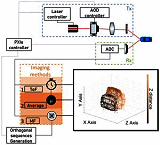 "A team from the Université Côte d'Azur
has addressed some of the challenges of
automotive lidar, using an acousto-optic modulator, a metasurface deflector
and, to improve range and signal to noise ratio, a technique borrowed from telecommunication.
Vehicle lidar sends out pulses and measures time-of-flight for returned pulses to
determine range. These pulses are sent one at a time, and scanned across a scene
by deflecting the pulse source vertically and horizontally. A forward-looking lidar
needs to scan sufficiently far ahead, with sufficient angular resolution, over a
sufficiently wide cone, to detect fast-moving objects and give the vehicle time
to react..." "A team from the Université Côte d'Azur
has addressed some of the challenges of
automotive lidar, using an acousto-optic modulator, a metasurface deflector
and, to improve range and signal to noise ratio, a technique borrowed from telecommunication.
Vehicle lidar sends out pulses and measures time-of-flight for returned pulses to
determine range. These pulses are sent one at a time, and scanned across a scene
by deflecting the pulse source vertically and horizontally. A forward-looking lidar
needs to scan sufficiently far ahead, with sufficient angular resolution, over a
sufficiently wide cone, to detect fast-moving objects and give the vehicle time
to react..."
 Superheterodyne receivers were originally
the sole domain of the Radio Corporation of America (RCA), which owned the patents
and refused to license them until around 1930. Hugo Gernsback, a contemporary editor
of the era, provides a little insight into superregenerative receiver (an Edwin
Armstrong invention in 1912) circuits which superheterodyne was about to replace,
and why it was an important improvement in technology. This appeared in a 1930 issue
of Radio-Craft magazine. Sidebar: The question often arises regarding the
difference between a "heterodyne" circuit and a "superheterodyne" circuit. The most
popular answer is that "super" (meaning "over") refers to the intermediate frequency
(IF) being located above the range of human hearing, which peaks at about 15 kHz.
Doing so assured that any IF leakage into the audio circuits would not be discernable
by the radio listener. Seems reasonable... Superheterodyne receivers were originally
the sole domain of the Radio Corporation of America (RCA), which owned the patents
and refused to license them until around 1930. Hugo Gernsback, a contemporary editor
of the era, provides a little insight into superregenerative receiver (an Edwin
Armstrong invention in 1912) circuits which superheterodyne was about to replace,
and why it was an important improvement in technology. This appeared in a 1930 issue
of Radio-Craft magazine. Sidebar: The question often arises regarding the
difference between a "heterodyne" circuit and a "superheterodyne" circuit. The most
popular answer is that "super" (meaning "over") refers to the intermediate frequency
(IF) being located above the range of human hearing, which peaks at about 15 kHz.
Doing so assured that any IF leakage into the audio circuits would not be discernable
by the radio listener. Seems reasonable...
 San Francisco Circuits, a leading provider
of high-quality printed circuit board (PCB) solutions, is excited to announce the
launch of their advanced
PCB reflow soldering capabilities. PCB reflow soldering is a critical process
in PCB assembly that involves the precise application of solder paste to securely
bond electronic components onto a PCB. This process ensures reliable connections
while minimizing thermal stress on the components, resulting in highly efficient
and durable circuit board assemblies. The introduction of PCB reflow soldering by
San Francisco Circuits brings several significant advantages to their customers.
By employing state-of-the-art reflow soldering equipment, the company is able to
achieve exceptional solder joint quality, ensuring optimal electrical conductivity
and mechanical strength. This technique allows for the assembly of complex PCBs
with a high component density... San Francisco Circuits, a leading provider
of high-quality printed circuit board (PCB) solutions, is excited to announce the
launch of their advanced
PCB reflow soldering capabilities. PCB reflow soldering is a critical process
in PCB assembly that involves the precise application of solder paste to securely
bond electronic components onto a PCB. This process ensures reliable connections
while minimizing thermal stress on the components, resulting in highly efficient
and durable circuit board assemblies. The introduction of PCB reflow soldering by
San Francisco Circuits brings several significant advantages to their customers.
By employing state-of-the-art reflow soldering equipment, the company is able to
achieve exceptional solder joint quality, ensuring optimal electrical conductivity
and mechanical strength. This technique allows for the assembly of complex PCBs
with a high component density...
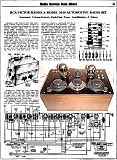 This Radio Service Data Sheet for the
RCA-Victor Radiola Model M-30 Automotive Radio Set is an example of the dozens
of similar schematic and alignment instruction sheets that have been posted on RF
Cafe over the years. It was published in a 1932 issue of Radio-Craft magazine. Obtaining
technical information on most things, even readily available items, prior to the
Internet era was often very difficult - if not impossible. Service centers had what
was needed provided by manufacturers and distributors, but if you wanted to find
a part number or service data on a refrigerator, radio, lawn mower, garage door
opener, etc., and did not have the original paperwork, you were usually out of luck.
Nowadays a Web search will quite often get you what you need thanks to people (like
me) who go to the trouble of making the information available. The stuff doesn't
just magically appear or get posted by benevolent governmental entities. This Radio Service Data Sheet for the
RCA-Victor Radiola Model M-30 Automotive Radio Set is an example of the dozens
of similar schematic and alignment instruction sheets that have been posted on RF
Cafe over the years. It was published in a 1932 issue of Radio-Craft magazine. Obtaining
technical information on most things, even readily available items, prior to the
Internet era was often very difficult - if not impossible. Service centers had what
was needed provided by manufacturers and distributors, but if you wanted to find
a part number or service data on a refrigerator, radio, lawn mower, garage door
opener, etc., and did not have the original paperwork, you were usually out of luck.
Nowadays a Web search will quite often get you what you need thanks to people (like
me) who go to the trouble of making the information available. The stuff doesn't
just magically appear or get posted by benevolent governmental entities.
 It was a lot of work, but I finally finished
a version of the "RF & Electronics Schematic & Block Diagram Symbols"" that
works well with Microsoft Office™ programs Word™, Excel™, and Power Point™.
This is an equivalent of the extensive set of amplifier, mixer, filter, switch,
connector, waveguide, digital, analog, antenna, and other commonly used symbols
for system block diagrams and schematics created for Visio™. Each of the 1,000 or
so symbols was exported individually from Visio in the EMF file format, then imported
into Word on a Drawing Canvas. The EMF format allows an image to be scaled up or
down without becoming pixelated, so all the shapes can be resized in a document
and still look good. The imported symbols can also be UnGrouped into their original
constituent parts for editing. Check them out! It was a lot of work, but I finally finished
a version of the "RF & Electronics Schematic & Block Diagram Symbols"" that
works well with Microsoft Office™ programs Word™, Excel™, and Power Point™.
This is an equivalent of the extensive set of amplifier, mixer, filter, switch,
connector, waveguide, digital, analog, antenna, and other commonly used symbols
for system block diagrams and schematics created for Visio™. Each of the 1,000 or
so symbols was exported individually from Visio in the EMF file format, then imported
into Word on a Drawing Canvas. The EMF format allows an image to be scaled up or
down without becoming pixelated, so all the shapes can be resized in a document
and still look good. The imported symbols can also be UnGrouped into their original
constituent parts for editing. Check them out!
 Since 1996, ISOTEC has designed, developed
and manufactured an extensive line of RF/microwave connectors, between-series adapters, RF components
and filters for wireless service providers including non-magnetic connectors for
quantum computing and MRI equipments etc. ISOTEC's product line includes low-PIM
RF connectors components such as power dividers and directional couplers. Off-the-shelf
and customized products up to 40 GHz and our low-PIM products can meet -160 dBc
with 2 tones and 20 W test. Quick prototyping, advanced in-house testing and
high-performance. Designs that are cost effective practical and repeatable. Since 1996, ISOTEC has designed, developed
and manufactured an extensive line of RF/microwave connectors, between-series adapters, RF components
and filters for wireless service providers including non-magnetic connectors for
quantum computing and MRI equipments etc. ISOTEC's product line includes low-PIM
RF connectors components such as power dividers and directional couplers. Off-the-shelf
and customized products up to 40 GHz and our low-PIM products can meet -160 dBc
with 2 tones and 20 W test. Quick prototyping, advanced in-house testing and
high-performance. Designs that are cost effective practical and repeatable.
Tuesday the 25th
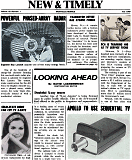 "New & Timely" was a monthly news feature
Radio-Electronics magazine published. Other titles were used over the years,
but the type of content was the same. The July 1969 issue reported on a phased array
radar antenna being developed by Hughes. That same photo appeared in the December
1971 edition of Popular Electronics magazine in a story entitled, "Giant
Billboard Antennas for Space-Age Radars." RCA (Radio Corporation of America)
and the U.S. government invested millions into inner-city training programs for
minorities. Trillion$$$ have been spent since then on such programs, paid for by
taxpayers, investors, and consumers. Quite interesting, and very relevant at the
time since Apollo 11 astronauts would land on the moon in July 1969 (the issue's
date), is that the color camera used for the missions is of the field-sequential
type. The first color TV broadcast in 1940 was a field-sequential system (CBS Labs,
using color filters on a spinning disk passing in front of the picture tube), but
ultimately lost out to RCA's dot-sequential system. Because of its simplicity, the
special Apollo TV field-sequential camera... "New & Timely" was a monthly news feature
Radio-Electronics magazine published. Other titles were used over the years,
but the type of content was the same. The July 1969 issue reported on a phased array
radar antenna being developed by Hughes. That same photo appeared in the December
1971 edition of Popular Electronics magazine in a story entitled, "Giant
Billboard Antennas for Space-Age Radars." RCA (Radio Corporation of America)
and the U.S. government invested millions into inner-city training programs for
minorities. Trillion$$$ have been spent since then on such programs, paid for by
taxpayers, investors, and consumers. Quite interesting, and very relevant at the
time since Apollo 11 astronauts would land on the moon in July 1969 (the issue's
date), is that the color camera used for the missions is of the field-sequential
type. The first color TV broadcast in 1940 was a field-sequential system (CBS Labs,
using color filters on a spinning disk passing in front of the picture tube), but
ultimately lost out to RCA's dot-sequential system. Because of its simplicity, the
special Apollo TV field-sequential camera...
 "A key feature of quantum mechanics is the
Heisenberg uncertainty principle, which states that complementary observables
(such as position and momentum or two orthogonal components of a system's spin)
cannot be measured simultaneously with exact precision. In a famous 1935 paper,
however, Albert Einstein, Boris Podolsky and Nathan Rosen (EPR) noted that if a
quantum system is entangled with another auxiliary system far away, then a measurement
made on the latter can be used to infer properties of the former. This would lower
the uncertainty for the system's observables below the Heisenberg limit – and, they
argued, create a paradoxical situation that clashes with classical notions of realism
and locality. Since 1935, EPR's paradoxical thought experiment has been performed
numerous times with small, few-body quantum systems. However, the question of whether
the non-classical character of quantum mechanics can be ..." "A key feature of quantum mechanics is the
Heisenberg uncertainty principle, which states that complementary observables
(such as position and momentum or two orthogonal components of a system's spin)
cannot be measured simultaneously with exact precision. In a famous 1935 paper,
however, Albert Einstein, Boris Podolsky and Nathan Rosen (EPR) noted that if a
quantum system is entangled with another auxiliary system far away, then a measurement
made on the latter can be used to infer properties of the former. This would lower
the uncertainty for the system's observables below the Heisenberg limit – and, they
argued, create a paradoxical situation that clashes with classical notions of realism
and locality. Since 1935, EPR's paradoxical thought experiment has been performed
numerous times with small, few-body quantum systems. However, the question of whether
the non-classical character of quantum mechanics can be ..."
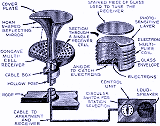 The ability to generate clean, controlled
radio waves at 3 THz in 1937 was about as attainable as putting a man on
the moon. That did not stop scientists and engineers from theorizing how to get
there and what to do once attained. That's the way science progress happens. An
official name had not yet been given to the spectrum realm, but news reporters conjured
up the moniker "mystery rays." Even scientists called it the "black gap." Both sound
a bit hokey and there is a temptation to poke fun at the renowned technical ignorance
of most media types, but no less a science giant as Albert Einstein referred to
quantum entanglement as "spooky action at a distance." The big idea of author W.E.
Shrage was to exploit and extend the concept of a cathode ray tube (CRT) to convert
streams of electrons into a visual image to use a photosensitive surface to directly
convert (no mixing to an IF) terahertz radio waves modulated with audio directly
into sound... The ability to generate clean, controlled
radio waves at 3 THz in 1937 was about as attainable as putting a man on
the moon. That did not stop scientists and engineers from theorizing how to get
there and what to do once attained. That's the way science progress happens. An
official name had not yet been given to the spectrum realm, but news reporters conjured
up the moniker "mystery rays." Even scientists called it the "black gap." Both sound
a bit hokey and there is a temptation to poke fun at the renowned technical ignorance
of most media types, but no less a science giant as Albert Einstein referred to
quantum entanglement as "spooky action at a distance." The big idea of author W.E.
Shrage was to exploit and extend the concept of a cathode ray tube (CRT) to convert
streams of electrons into a visual image to use a photosensitive surface to directly
convert (no mixing to an IF) terahertz radio waves modulated with audio directly
into sound...
 Sam Benzacar of Anatech Electronics, an
RF and microwave filter company, has published his July 2023 newsletter that features
his short op-ed titled "Another
Annoyance for Radio Astronomers." In it, Sam discusses a subject I have highlighted
a few times, which is the interference issues being caused by the massive satellite
constellations being deployed around the Earth. Between Starlink (SpaceX) and Project
Kuiper (Amazon), Guo Wang (China), and Europe planning one of its own, as many as
100,000 satellites ultimately (maybe more, with >4,000 already deployed), many
in low Earth orbit (LEO), could be blocking radio frequency, infrared, visible light,
ultraviolet, and x-ray information from cleanly reaching terrestrial astronomy telescopes.
Ingenuous solutions to mitigating scintillation effects of the atmosphere have been
devised, but no similar method can be used for satellite interference. Sam's write-up
has to do specifically with the newly discovered RFI being created from the satellites
themselves - it appears in bands specifically reserved for radio astronomy. As you
know, uncorrelated inband interference is very difficult to mitigate... Sam Benzacar of Anatech Electronics, an
RF and microwave filter company, has published his July 2023 newsletter that features
his short op-ed titled "Another
Annoyance for Radio Astronomers." In it, Sam discusses a subject I have highlighted
a few times, which is the interference issues being caused by the massive satellite
constellations being deployed around the Earth. Between Starlink (SpaceX) and Project
Kuiper (Amazon), Guo Wang (China), and Europe planning one of its own, as many as
100,000 satellites ultimately (maybe more, with >4,000 already deployed), many
in low Earth orbit (LEO), could be blocking radio frequency, infrared, visible light,
ultraviolet, and x-ray information from cleanly reaching terrestrial astronomy telescopes.
Ingenuous solutions to mitigating scintillation effects of the atmosphere have been
devised, but no similar method can be used for satellite interference. Sam's write-up
has to do specifically with the newly discovered RFI being created from the satellites
themselves - it appears in bands specifically reserved for radio astronomy. As you
know, uncorrelated inband interference is very difficult to mitigate...
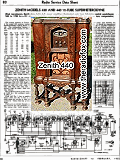 In a continuing effort to provide archival
material for researchers and for anyone seeking information on a particular radio
restoration project, this Radio Service Data Sheet for the
Zenith Model 430/440 radio from a 1933 edition of Radio-Craft magazine
is being posted. An Internet search will show that there are many people engaging
in such activities. Restoring my Crosley Model 03BC console radio would have been
more difficult if not for others who have done similar work to assist the "community."
I generally despise the phrase "giving back" because it is usually uttered by people
that really owe nothing to anyone, but somehow feel obligated to do so or are conditioned
to automatically say such things. This is a case where I benefitted from somebody
else's work and there is an opportunity to return the favor... In a continuing effort to provide archival
material for researchers and for anyone seeking information on a particular radio
restoration project, this Radio Service Data Sheet for the
Zenith Model 430/440 radio from a 1933 edition of Radio-Craft magazine
is being posted. An Internet search will show that there are many people engaging
in such activities. Restoring my Crosley Model 03BC console radio would have been
more difficult if not for others who have done similar work to assist the "community."
I generally despise the phrase "giving back" because it is usually uttered by people
that really owe nothing to anyone, but somehow feel obligated to do so or are conditioned
to automatically say such things. This is a case where I benefitted from somebody
else's work and there is an opportunity to return the favor...
 Banner Ads are rotated in all locations
on the page! RF Cafe typically receives 8,000-15,000 visits each
weekday. RF Cafe
is a favorite of engineers, technicians, hobbyists, and students all over the world.
With more than 17,000 pages in the Google search index, RF Cafe returns in
favorable positions on many types of key searches, both for text and images.
Your 728x90-px and 160x600-px Banner Ads are displayed on average 225,000 times
per year! New content is added on a daily basis, which keeps the major search
engines interested enough to spider it multiple times each day. Items added on the
homepage often can be found in a Google search within a few hours of being posted. If you need your company news to
be seen, RF Cafe is the place to be... Banner Ads are rotated in all locations
on the page! RF Cafe typically receives 8,000-15,000 visits each
weekday. RF Cafe
is a favorite of engineers, technicians, hobbyists, and students all over the world.
With more than 17,000 pages in the Google search index, RF Cafe returns in
favorable positions on many types of key searches, both for text and images.
Your 728x90-px and 160x600-px Banner Ads are displayed on average 225,000 times
per year! New content is added on a daily basis, which keeps the major search
engines interested enough to spider it multiple times each day. Items added on the
homepage often can be found in a Google search within a few hours of being posted. If you need your company news to
be seen, RF Cafe is the place to be...
 TotalTemp Technologies has more than 40
years of combined experience providing thermal platforms.
Thermal Platforms
are available to provide temperatures between -100°C and +200°C for cryogenic cooling,
recirculating & circulating coolers, temperature chambers and temperature controllers,
thermal range safety controllers, space simulation chambers, hybrid benchtop chambers,
custom systems and platforms. Manual and automated configurations for laboratory
and production environments. Please contact TotalTemp Technologies today to learn
how they can help your project. TotalTemp Technologies has more than 40
years of combined experience providing thermal platforms.
Thermal Platforms
are available to provide temperatures between -100°C and +200°C for cryogenic cooling,
recirculating & circulating coolers, temperature chambers and temperature controllers,
thermal range safety controllers, space simulation chambers, hybrid benchtop chambers,
custom systems and platforms. Manual and automated configurations for laboratory
and production environments. Please contact TotalTemp Technologies today to learn
how they can help your project.
Monday the 24th
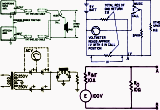 One of the nice things about these "What's
Your EQ?" challenges that appeared in Radio-Electronics magazine is
that they tax your ability to recall basic electronics circuit theory. The first
one in the June 1964 issue requires you (spoiler here) to apply Thévenin's theorem
in order to arrive at the solution. You also need to know about maximum power transfer
which (another spoiler) requires the load impedance to be the complex conjugate
of the source impedance. "No Volts" will make you very appreciative of today's high
input impedance voltmeters; the problem statement itself made my head hurt. Being
aware of such issues often meant the difference between success and failure when
assessing television and radio circuits. "Music-Intercom Trouble" almost certainly
was inspired by a 1960 Electronics World episode of "Mac's Radio Service
Shop," titled "Technician or Consulting Engineer?." Have at it... One of the nice things about these "What's
Your EQ?" challenges that appeared in Radio-Electronics magazine is
that they tax your ability to recall basic electronics circuit theory. The first
one in the June 1964 issue requires you (spoiler here) to apply Thévenin's theorem
in order to arrive at the solution. You also need to know about maximum power transfer
which (another spoiler) requires the load impedance to be the complex conjugate
of the source impedance. "No Volts" will make you very appreciative of today's high
input impedance voltmeters; the problem statement itself made my head hurt. Being
aware of such issues often meant the difference between success and failure when
assessing television and radio circuits. "Music-Intercom Trouble" almost certainly
was inspired by a 1960 Electronics World episode of "Mac's Radio Service
Shop," titled "Technician or Consulting Engineer?." Have at it...
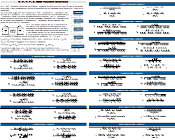 This table of conversions between various
forms of 2-port network electrical
parameters is difficult to find, so once I finally located a paper that included
them, I felt it was my duty to publish it for public access. The paper is available
on the IEEE website by subscribers only. Other have published the full paper without
permission of author Frickey. None that I found also include the correction paper
published a year later that addresses some of the technicalities of the S- and T-parameter
translations when complex impedance reference planes are used. In order to avoid
those sticky issues, I have reproduced only the sets of translations that are unaffected.
Many thanks to Mr. Frickey for his unique work. S-Parameters Y-Parameters Z-Parameters
h-Parameters ABCD-Parameters3 One of the most sought-after sets of conversion is
from s-parameters to T-parameters, and then back to s-parameters. This is because
matrix multiplications can be performed directly on T-parameters in order to calculate
cascaded component responses... This table of conversions between various
forms of 2-port network electrical
parameters is difficult to find, so once I finally located a paper that included
them, I felt it was my duty to publish it for public access. The paper is available
on the IEEE website by subscribers only. Other have published the full paper without
permission of author Frickey. None that I found also include the correction paper
published a year later that addresses some of the technicalities of the S- and T-parameter
translations when complex impedance reference planes are used. In order to avoid
those sticky issues, I have reproduced only the sets of translations that are unaffected.
Many thanks to Mr. Frickey for his unique work. S-Parameters Y-Parameters Z-Parameters
h-Parameters ABCD-Parameters3 One of the most sought-after sets of conversion is
from s-parameters to T-parameters, and then back to s-parameters. This is because
matrix multiplications can be performed directly on T-parameters in order to calculate
cascaded component responses...
 "As soon as we were inside, one introduced
himself as an FBI agent and showed me his identification. He introduced the other
man as a law officer from one of the northern counties. Maybe you think I wasn't
hastily reviewing my most recent sins as we sat down!" That line from
Mac McGregor cracked me up! He was telling stories of his earlier Ham radio
days to Barney during a lull in business in the electronics repair shop, in the
August 1973 issue of Popular Electronics magazine. The last anecdote concerns
his service as an Amateur helping to establish and run a communications net during
a spate of tornadoes in the Midwest - a scenario familiar to us now with the massive
damage done by major hurricanes and tornadoes in recent years, as populated areas
expand, making more property and lives vulnerable... "As soon as we were inside, one introduced
himself as an FBI agent and showed me his identification. He introduced the other
man as a law officer from one of the northern counties. Maybe you think I wasn't
hastily reviewing my most recent sins as we sat down!" That line from
Mac McGregor cracked me up! He was telling stories of his earlier Ham radio
days to Barney during a lull in business in the electronics repair shop, in the
August 1973 issue of Popular Electronics magazine. The last anecdote concerns
his service as an Amateur helping to establish and run a communications net during
a spate of tornadoes in the Midwest - a scenario familiar to us now with the massive
damage done by major hurricanes and tornadoes in recent years, as populated areas
expand, making more property and lives vulnerable...
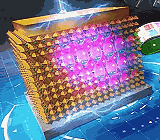 "Researchers have developed an advanced
dielectric capacitor using nanosheet technology, providing unprecedented energy
storage density and stability. This breakthrough could significantly enhance renewable
energy usage and electric vehicle production. A research group, led by Nagoya University
in Japan, has innovatively applied nanosheet technology to create a dielectric capacitor.
This development holds significant implications for advanced electronic and electrical
power systems. Innovations in energy storage technology are vital for the effective
use of renewable energy and the mass production of electric vehicles. The dielectric
capacitor stands as a major advancement in technology, boasting the highest energy
storage density..." "Researchers have developed an advanced
dielectric capacitor using nanosheet technology, providing unprecedented energy
storage density and stability. This breakthrough could significantly enhance renewable
energy usage and electric vehicle production. A research group, led by Nagoya University
in Japan, has innovatively applied nanosheet technology to create a dielectric capacitor.
This development holds significant implications for advanced electronic and electrical
power systems. Innovations in energy storage technology are vital for the effective
use of renewable energy and the mass production of electric vehicles. The dielectric
capacitor stands as a major advancement in technology, boasting the highest energy
storage density..."
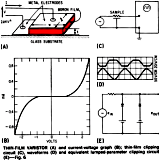 When Charles Feldman published this article
on
thin-film transistors (TFTs) in a 1964 issue of Electronics magazine, he had
no idea that the devices would eventually play a major role in liquid crystal displays
(LCDs) in everything from wristwatches to large screen television and computer displays.
Materials and fabrication techniques have evolved considerably since 1964, but the
fundamentals remain the same. Other than LCDs and some solid-state sensors, I am
not familiar with any other applications that are heavy users of TFT technology.
This 2016 paper titled, "Review on thin-film transistor technology, its applications,
and possible new applications to biological cells," gives a little historical perspective
and a comparison of CMOS versus TFT... When Charles Feldman published this article
on
thin-film transistors (TFTs) in a 1964 issue of Electronics magazine, he had
no idea that the devices would eventually play a major role in liquid crystal displays
(LCDs) in everything from wristwatches to large screen television and computer displays.
Materials and fabrication techniques have evolved considerably since 1964, but the
fundamentals remain the same. Other than LCDs and some solid-state sensors, I am
not familiar with any other applications that are heavy users of TFT technology.
This 2016 paper titled, "Review on thin-film transistor technology, its applications,
and possible new applications to biological cells," gives a little historical perspective
and a comparison of CMOS versus TFT...
 RF Cascade Workbook is the next phase in the evolution of
RF Cafe's long-running series, RF Cascade Workbook. Chances are you have
never used a spreadsheet quite like this (click here for screen capture). It is a full-featured RF system
cascade parameter and frequency planner that includes filters and mixers for a mere
$45. Built in MS Excel, using RF Cascade Workbook 2018 is a cinch
and the format is entirely customizable. It is significantly easier and faster than
using a multi-thousand dollar simulator when a high level system analysis is all
that is needed. An intro video takes you through the main features...
RF Cascade Workbook is the next phase in the evolution of
RF Cafe's long-running series, RF Cascade Workbook. Chances are you have
never used a spreadsheet quite like this (click here for screen capture). It is a full-featured RF system
cascade parameter and frequency planner that includes filters and mixers for a mere
$45. Built in MS Excel, using RF Cascade Workbook 2018 is a cinch
and the format is entirely customizable. It is significantly easier and faster than
using a multi-thousand dollar simulator when a high level system analysis is all
that is needed. An intro video takes you through the main features...
 Innovative Power Products has been designing
and manufacturing RF and Microwave passive components since 2005. We use the latest
design tools available to build our baluns, 90-degree couplers, directional couplers,
combiners/dividers, single-ended transformers, resistors, terminations, and custom
products. Applications in military, medical, industrial, and commercial markets
are serviced around the world. Products listed on the website link to detailed mechanical
drawings, electrical specifications, and performance data. If you cannot find a
product that meets your requirements on our website, contact us to speak with one
of our experienced design engineers about your project. Innovative Power Products has been designing
and manufacturing RF and Microwave passive components since 2005. We use the latest
design tools available to build our baluns, 90-degree couplers, directional couplers,
combiners/dividers, single-ended transformers, resistors, terminations, and custom
products. Applications in military, medical, industrial, and commercial markets
are serviced around the world. Products listed on the website link to detailed mechanical
drawings, electrical specifications, and performance data. If you cannot find a
product that meets your requirements on our website, contact us to speak with one
of our experienced design engineers about your project.
Sunday the 23rd
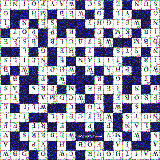 This custom RF Cafe
electronics-themed crossword puzzle for July 23rd contains words and clues which
pertain exclusively to the subjects of electronics, science, physics, mechanics,
engineering, power distribution, astronomy, chemistry, etc. If you do see names
of people or places, they are intimately related to the aforementioned areas of
study. Being that "W" is the 23rd letter of the alphabet, it is used as the first
and/or last letter of many words in today's crossword puzzle - as well as in-between.
Those clues are marked with an asterisk (*). As always, you will find no references
to numbnut movie stars or fashion designers. Need more crossword RF Cafe puzzles?
A list at the bottom of the page links to hundreds of them dating back to the year
2000. Enjoy. This custom RF Cafe
electronics-themed crossword puzzle for July 23rd contains words and clues which
pertain exclusively to the subjects of electronics, science, physics, mechanics,
engineering, power distribution, astronomy, chemistry, etc. If you do see names
of people or places, they are intimately related to the aforementioned areas of
study. Being that "W" is the 23rd letter of the alphabet, it is used as the first
and/or last letter of many words in today's crossword puzzle - as well as in-between.
Those clues are marked with an asterisk (*). As always, you will find no references
to numbnut movie stars or fashion designers. Need more crossword RF Cafe puzzles?
A list at the bottom of the page links to hundreds of them dating back to the year
2000. Enjoy.
 The RFCafe.com website exists partly on the support
of its visitors by way of a small percentage earned with your
Amazon.com purchases, which typically works out to less than
$20 per month. That does not even cover the domain registration and secure server
fees for RFCafe.com. If you plan to buy items via
Amazon.com, please click on this link to begin your shopping
session from here so that I get credit for it. Doing so does not cost you anything
extra. Thank you for your support. The RFCafe.com website exists partly on the support
of its visitors by way of a small percentage earned with your
Amazon.com purchases, which typically works out to less than
$20 per month. That does not even cover the domain registration and secure server
fees for RFCafe.com. If you plan to buy items via
Amazon.com, please click on this link to begin your shopping
session from here so that I get credit for it. Doing so does not cost you anything
extra. Thank you for your support.
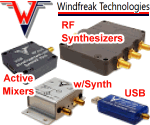 Windfreak Technologies designs, manufactures,
tests and sells high value USB powered and controlled radio frequency products
such as RF signal generators, RF synthesizers, RF power detectors, mixers, up /
downconverters. Since the conception of WFT, we have introduced products that have
been purchased by a wide range of customers, from hobbyists to education facilities
to government agencies. Worldwide customers include Europe, Australia, and Asia.
Please contact Windfreak today to learn how they might help you with your current
project. Windfreak Technologies designs, manufactures,
tests and sells high value USB powered and controlled radio frequency products
such as RF signal generators, RF synthesizers, RF power detectors, mixers, up /
downconverters. Since the conception of WFT, we have introduced products that have
been purchased by a wide range of customers, from hobbyists to education facilities
to government agencies. Worldwide customers include Europe, Australia, and Asia.
Please contact Windfreak today to learn how they might help you with your current
project.
These archive pages are provided in order to make it easier for you to find items
that you remember seeing on the RF Cafe homepage. Of course probably the easiest
way to find anything on the website is to use the "Search
RF Cafe" box at the top of every page. Some quoted items have been shortened
to save space. About RF Cafe.
Homepage Archive Pages
2026:
Jan |
Feb | Mar | Apr | May | Jun | Jul | Aug
| Sep | Oct | Nov | Dec
2025:
Jan |
Feb |
Mar |
Apr |
May |
Jun |
Jul |
Aug |
Sep |
Oct |
Nov |
Dec
2024:
Jan |
Feb |
Mar |
Apr |
May |
Jun |
Jul |
Aug |
Sep |
Oct |
Nov |
Dec
2023:
Jan |
Feb |
Mar |
Apr |
May |
Jun |
Jul |
Aug |
Sep |
Oct |
Nov |
Dec
2022:
Jan |
Feb |
Mar |
Apr |
May |
Jun |
Jul |
Aug |
Sep |
Oct |
Nov |
Dec
2021:
Jan |
Feb |
Mar |
Apr |
May |
Jun |
Jul |
Aug |
Sep |
Oct |
Nov |
Dec
2020:
Jan |
Feb |
Mar |
Apr |
May |
Jun |
Jul |
Aug |
Sep |
Oct |
Nov |
Dec
2019:
Jan |
Feb |
Mar |
Apr |
May |
Jun |
Jul |
Aug |
Sep |
Oct |
Nov |
Dec
2018:
Jan |
Feb |
Mar |
Apr |
May |
Jun |
Jul |
Aug |
Sep |
Oct |
Nov |
Dec
2017:
Jan | Feb |
Mar |
Apr |
May |
Jun |
Jul |
Aug |
Sep |
Oct |
Nov |
Dec
2016:
Jan | Feb |
Mar |
Apr |
May |
Jun |
Jul |
Aug |
Sep |
Oct |
Nov |
Dec
2015:
Jan | Feb |
Mar |
Apr |
May |
Jun |
Jul |
Aug | Sep |
Oct |
Nov |
Dec
2014:
Jan | Feb |
Mar |
Apr |
May |
Jun |
Jul |
Aug |
Sep |
Oct |
Nov |
Dec
2013:
Jan | Feb |
Mar |
Apr |
May |
Jun |
Jul |
Aug |
Sep |
Oct |
Nov |
Dec
2012: 1 |
2 | 3
| 4 | 5
| 6 | 7
| 8 | 9
| 10 | 11
| 12 | 13
(no archives before 2012)
- Christmas-themed
items
|






 Frequency crowding
Frequency crowding




















 Superheterodyne receivers
Superheterodyne receivers















 Innovative Power Products
Innovative Power Products





